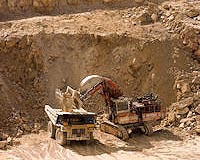 |
New Delhi (AFP) Aug 26, 2010 New legislation aimed at throwing open India's lucrative 150-billion-dollar civilian atomic energy market could deter private suppliers because of tough provisions, business groups said Thursday. The nuclear liability bill, key to implementing a 2008 flagship atomic energy pact with the United States that granted India access to foreign civilian technology, was passed by lawmakers late Wednesday after the government conceded to opposition demands to strengthen the measure. But business groups say the bill, intended to give private firms such as US-based General Electric access to India, could throw new hurdles in the way of the energy-hungry country's nascent nuclear power sector. They have zeroed in on a clause in the bill that would allow nuclear power plant operators to pursue suppliers of equipment, raw materials and services for 80 years after the construction of any plant in the event of an accident. The legislation threatens to hamper India's "nuclear renaissance and completely undo the government's efforts to accelerate nuclear power generation in our country," said the Federation of Indian Chambers of Commerce and Industry (FICCI) in a statement. "This will surely affect our generation capacity," FICCI economic adviser Anjan Roy told AFP. "The bill has put very extended obligations on suppliers." On Wednesday, Premier Manmohan Singh said the measure would end a decades-old "nuclear apartheid" that had prevented India from buying reactors and nuclear fuel abroad, after it conducted nuclear tests in the early 1970s. The legislation now goes before the upper house, where it is expected to receive much easier passage. It will then be signed into law by India's president before a visit by President Barack Obama in November. The legislation, wider in scope than a 1997 agreement signed by over 80 countries following the Chernobyl nuclear disaster, has also been criticised by India's other leading business group, the Confederation of Indian Industry. The group's director general, Chandrajit Banerjee, said the liability period was "a major deterrent" for suppliers and went against the global practice -- enshrined in the Chernobyl agreement -- of placing liability exclusively on operators. He added long-term insurance cover for suppliers was not available globally and the provision "would stall the growth of the nuclear manufacturing industry in India". No supplier would be willing to assume such a liability for 80 years after a contract is executed, said Sudhinder Thakur, executive director of the Nuclear Power Corp of India, India's lone nuclear power operator, calling the provisions "neither practical nor implementable." Critics of weaker versions of the bill had drawn parallels with the 1984 industrial disaster in Bhopal, central India, which involved US firm Union Carbide. It settled its liabilities with the government over the accident, which killed tens of thousands of people, with a 470-million-dollar out-of-court settlement in 1989, which many say covered just a fraction of the overall costs. The law was intended to satisfy private suppliers General Electric and Westinghouse Electric, a unit of Japan's Toshiba Corp., which had been reluctant to invest in India without a legal framework setting out their liability. French and Russian state-owned nuclear firms, whose liabilities are underwritten by their governments, have already signed numerous deals. India is hoping nuclear power will supply 25 percent of its electricity by 2050.
Share This Article With Planet Earth
Related Links Nuclear Power News - Nuclear Science, Nuclear Technology Powering The World in the 21st Century at Energy-Daily.com
 Quebecers full of hope and fear over uranium
Quebecers full of hope and fear over uraniumMontreal (AFP) Aug 25, 2010 A global nuclear energy renaissance has reignited interest in uranium mining in Canada, the world leader in the sector, but also apprehensions by some who fear radioactive pollution. In Quebec City, environmental activists set up a mock mining camp on the lawn of the provincial legislature to voice their opposition, and legally obtained an exploration permit via the Internet to dig under Que ... read more |
|
| The content herein, unless otherwise known to be public domain, are Copyright 1995-2010 - SpaceDaily. AFP and UPI Wire Stories are copyright Agence France-Presse and United Press International. ESA Portal Reports are copyright European Space Agency. All NASA sourced material is public domain. Additional copyrights may apply in whole or part to other bona fide parties. Advertising does not imply endorsement,agreement or approval of any opinions, statements or information provided by SpaceDaily on any Web page published or hosted by SpaceDaily. Privacy Statement |